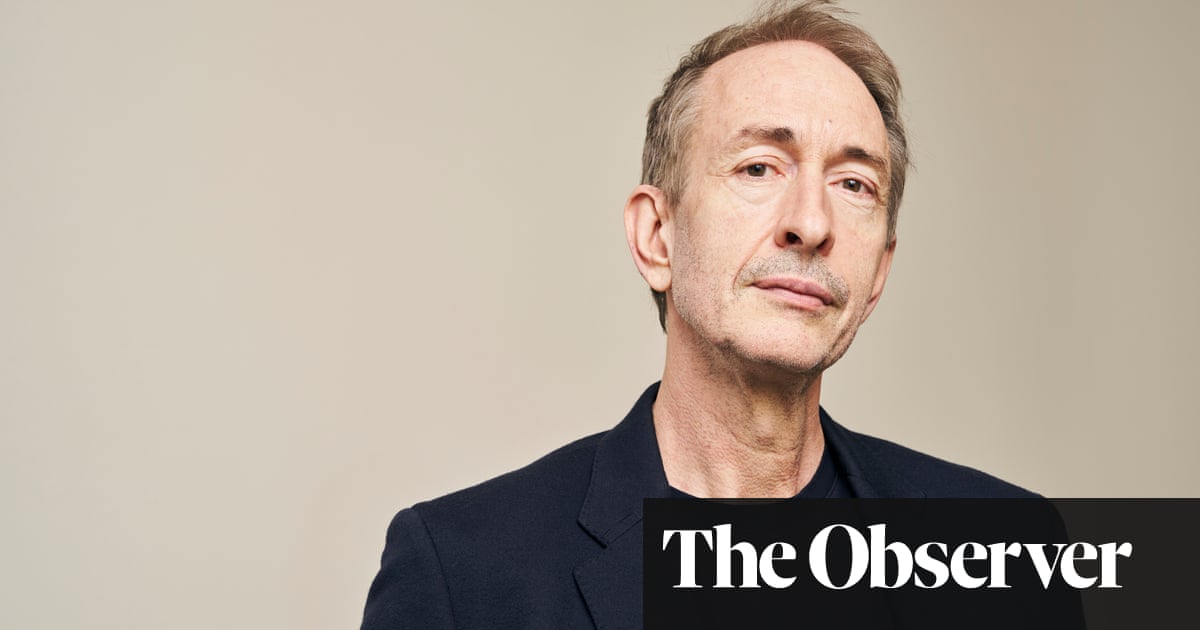Mat Osman is, along with Brett Anderson, a founding and current member of the band Suede, and the author of two novels. The Ruins, published in 2020, is a modern murder mystery about estranged brothers. His latest, The Ghost Theatre, is set in Elizabethan London and tells the tale of the Blackfriars Boys, a real life Elizabethan theatre troupe made up of children who were often snatched from the streets to act in popular plays of the day. They are joined by Shay, a young female âAviscultanâ; a worshipper of the birds that she communes with as she scales the cityâs rooftops on the run from her enemies. The book has been widely praised and the Guardian picked it as one of its novels of 2023. Osman is the older brother of TV presenter and fellow novelist Richard Osman and lives in north-west London..
It isnât the kind of book you imagine a musician would writeâ¦
I really hope thatâs true. My first novel was about a musician, about brothers and stuff and it drew from [my] experience. [With The Ghost Theatre] I was really aware that I wanted to write something without a safety net, where I had to make it all up. Because I want to be a writer, not a musician who has written a book.
Where did the idea come from?
I came across a story about a kid who got kidnapped for the stage in 1601. All sorts of children were stolen off the street to perform. Everyone in London went to the theatre, it was the entertainment and these kids were incredibly famous, performing for the Queen. But at the same time they were basically property. They were bought and sold and pimped out. I just wanted to know what that would feel like. Thatâs how it started. But about halfway through, it just turned into an adventure story, a kind of historical romp, which I hadnât really meant to write.
Where did Shay and her bird worshipping community come from?
From, as many things do, a conversation on a tour bus. Just talking about the religions that have worshipped animals: cats, bulls that kind of thing. There doesnât seem to have been one that worshiped birds. It seemed strange to me, because they seem very worshippable. You know, they live in the heavens, theyâre ineffable. Theyâre beautiful and cruel. And we donât really understand them. I mean, they make perfect gods.
The book is something of a love letter to London. You were brought up in Haywards Heath â what was your first experience of the city?
The first time I came to London was with a friend and his dad to see Simple Minds. It must have been at Hammersmith [Odeon] because I can remember coming over Hammersmith Bridge. I was in love with London before I ever got here to be honest. I mean, I devoured anything [to do with it]. The Sex Pistols, the Jam â I already had a kind of musical London in my head. Iâve lived here for 35 years now and I still absolutely love it. But I wanted to write about a real London, a dirty, dangerous, working-class London. You know, I was the posh one in Suede, because my mum was a teacher. When we started here no one had any money, not a single band I knew⦠it was kind of a working-class pursuit, an ordinary personâs pursuit. And that doesnât exist any more. It really doesnât.
Can you recommend other books by musicians?
Thereâs a guy called John Darnielle. An incredibly talented man who fronts an American band called the Mountain Goats, who are great. Heâs written a couple of books, Wolf in White Van and Universal Harvester, which are both absolutely brilliant. Universal Harvester â if anyone reading this is from Netflix or Amazon â is like a brilliantly adult Stranger Things and should be made into a film or TV programme immediately.
Which authors do you always return to?
Michael Chabon, also Michel Faber and Iain Banks, who made me feel like I could be a writer because, in terms of style, nothingâs off limits. I love writers who overspill the boundaries, whose ideas are too big for one genre. Itâs one of the things I find frustrating about publishing â these little boxes you get put in. I didnât want The Ghost Theatre to be [classed as] historical fiction. Itâs just fiction that happens to be set in that time.
Whatâs your next book about?
A tech billionaire and his staff trapped in a bunker after the apocalypse. Iâve spent the past six months terrifying myself, looking at these underground bunkers that everyone who has a stake in our future is building.
Your brother Richard is also, famously, an author. Which is your favourite of his Thursday Murder Club books?
The last one [The Last Devil to Die]. I mean, I like them all. Itâs not the kind of thing that I would normally read but the minute I read the first sentence of the first one â he sent it to me six months before it was published â it was just like: âOK, he knows what heâs doing.â But the last one I thought was really nice. The descriptions of dementia and coping with it were brilliantly done. Really sad but not sentimental â itâs a hard thing to do.
He has said that your books are dark with a touch of mainstream while his are the opposite. Do you agree?
Yes, totally. Itâs always been the way. When we were growing up he was into Saturday night TV and golf and snooker â heâs always loved the mainstream. Itâs not an affectation. He has mainstream taste, whereas I was always kind of obsessed with anything that was cool. Thatâs why most people form a band. Itâs not for the reasons that are really important to me now â that sense of community, touching people. It was because, you know, I wasnât very cool and I wanted to be.
Why are the Osmans so successful?
I really have no idea. Every now and then the pair of us do marvel at it because I think if youâd met us at about 15, youâd have thought, well⦠good luck to those two!










